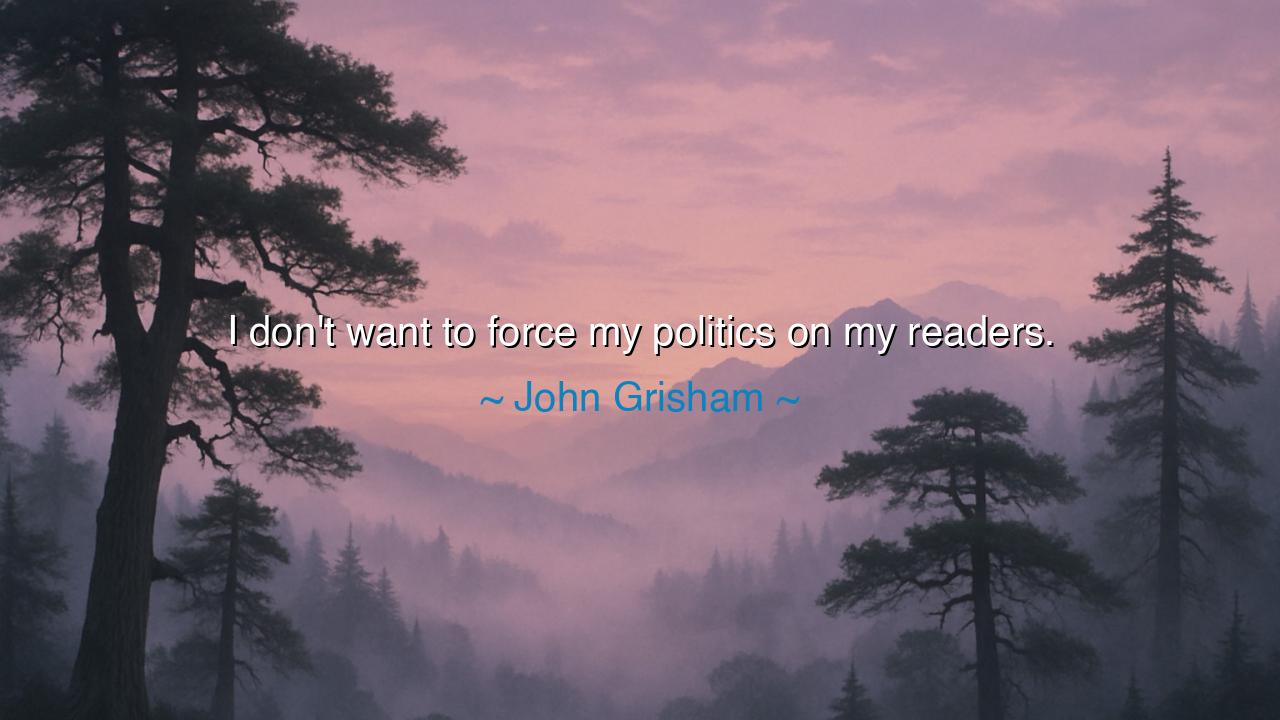
I don't want to force my politics on my readers.






Hearken, children of the ages, and heed the words of John Grisham: “I don't want to force my politics on my readers.” In this simple declaration lies a profound meditation on the power of words, the freedom of thought, and the respect owed to the minds of others. To compel belief is to trample the sacred realm of individual discernment; to offer thought is to plant seeds, not to bind hearts in chains. Grisham teaches that true communication honors the autonomy of the listener, granting them the space to perceive, question, and decide.
The origin of this wisdom springs from Grisham’s life as a writer of legal thrillers, a storyteller whose craft demands engagement with justice, law, and morality. While his novels often explore political and legal themes, he understands that his role is not that of a proselytizer, but of a guide—an observer of the human condition who illuminates rather than dictates. In choosing not to impose his beliefs, Grisham upholds a timeless principle: persuasion arises not from force, but from reason, empathy, and storytelling that invites reflection.
Consider the tale of Voltaire, who wielded words with both wit and precision, challenging tyranny and injustice without coercion. His essays and letters provoked thought, yet he refrained from imposing doctrine; his genius lay in fostering reflection, allowing the reader to discover truth through engagement, not compulsion. In this, he embodies the spirit of Grisham’s restraint: the mind must be free to choose, or the lesson is hollow.
Even in the ordinary realm, this principle resonates. Teachers, leaders, and elders who share knowledge without coercion cultivate deeper understanding, while those who impose their views often breed resistance and shallow compliance. By presenting ideas and inviting inquiry, they honor the dignity of the human mind and preserve the integrity of thought. Grisham’s words remind us that writing, like life, flourishes when it respects the autonomy of the soul.
History offers further examples: consider Mahatma Gandhi, whose advocacy for justice and freedom never relied on forceful indoctrination. He inspired millions through example, dialogue, and moral clarity, leaving each individual free to act in accordance with conscience. His influence endured not because he compelled belief, but because he modeled wisdom, patience, and choice—a testament to the power of voluntary persuasion.
Therefore, children of future generations, take this counsel to heart: the might of words lies not in coercion, but in invitation. Share your thoughts, illuminate the path, but never force your politics, your beliefs, or your truths upon others. In honoring the freedom of the mind, you cultivate wisdom, respect, and the lasting power of ideas—a legacy far greater than the fleeting triumph of imposed opinion.






TBNguyen Tan bIn
There’s also an audience trust issue. Some readers feel manipulated if ideology peeks through; others feel shortchanged if the story dodges obvious stakes. How do you honor both? Maybe the answer is to center human consequences and let politics remain a discoverable layer—plus offer companion material for book clubs that surfaces trade-offs without prescribing conclusions. Open question: when adaptations arrive, would you set guardrails to prevent heavy-handed messaging that wasn’t in the text, or do you prefer to let interpreters reinterpret freely?
VTNhi Vu Tuyet
From a craft lens, tension often comes from systems—courts, banks, hospitals—that are inherently value-laden. I’m fascinated by how you dramatize institutional pressures without drifting into lectures. Do you prototype scenes where characters’ incentives clash so the system critiques itself through action? I’d love a peek at your revision checklist: swap monologues for conflicting testimony, let small procedural choices snowball, and trim adjectives that editorialize. Closed question: do you map each chapter’s “persuasion risk” to keep momentum high and rhetoric low?
LNThuy Linh Nguyen
Part of me worries that the quest for non-imposition can morph into a performance of neutrality. When a story brushes against injustice—say, wrongful convictions or corporate malfeasance—staying understated might feel like silence, not respect. Where’s the line between artistic restraint and abdication? Closed question: would you ever include an author’s note outlining sources and your personal priors, so readers can calibrate trust while the narrative remains uncluttered? I’m curious what transparency looks like without turning the novel into an op-ed.
TVTran Thu Van
As a reader, I appreciate the instinct not to sermonize; fiction feels most alive when it invites me to think rather than corrals me. Still, every plot choice and character arc smuggles a set of values. How do you preserve reader autonomy without pretending to be value-free? Do you balance viewpoints through equally competent characters and let consequences, not speeches, carry weight? I’d love to hear concrete craft tactics—Socratic dialogue, ambiguous endings, or parallel subplots—that protect interpretation from authorial overreach.